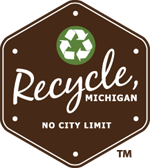Where Does MI Waste Go?
 |
Recycling Recycling is a series of activities that includes collecting recyclable materials that would otherwise be considered waste, sorting and processing recyclables into raw materials, and manufacturing raw materials into new products. – US EPA |
 |
Composting Compost is the product resulting from the controlled biological decomposition of organic material that has been sanitized through the generation of heat and processed to further reduce pathogens and stabilized to the point that it is beneficial to plant growth. – United States Composting Council |
 |
Anaerobic Digestion Anaerobic Digestion (AD) is a biological process similar in many ways to composting. It is a natural treatment process in which bacteria break down organic matter and reduce its bulk or “mass.” AD is carried out in an oxygen-free environment (known as anaerobic conditions) to allow the presence of bacteria adjusted to these conditions, which then multiply and grow; by so doing, it is possible to achieve sanitation of the feed material and of any liquid being discharged; a net positive surplus generation of energy as a biofuel to allow power production from methane gas (biogas) produced by the organisms. – Anaerobic Digestion.com |
 |
Biogasification Biogasification is the biological decomposition of organic matter of biological origin under anaerobic conditions with an accompanying production primarily of methane (CH4) and secondarily of other gasses, chief of which is carbon dioxide (CO2). The two features that distinguish the process as defined from other forms of biological decomposition are the fact that the decomposition occurs without oxygyn or under anaerobic conditions. Most importantly, the technology is utilized in the production of methane gas, and ultimately, electricity. – International Env. Technology Center |
 |
Landfill A landfill is a location to dispose of waste materials by burying under soil. |
